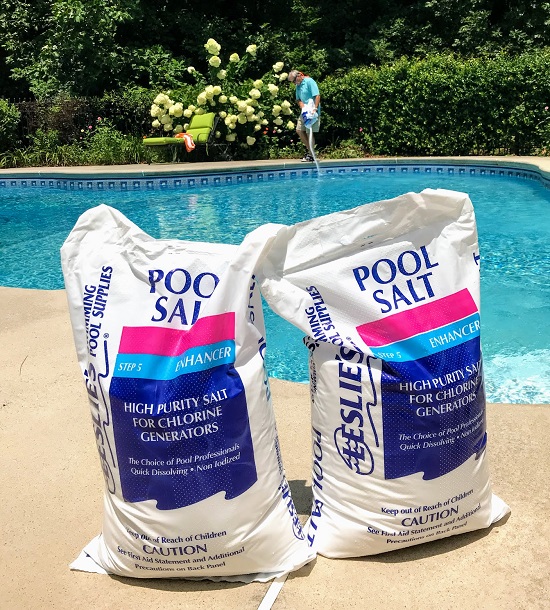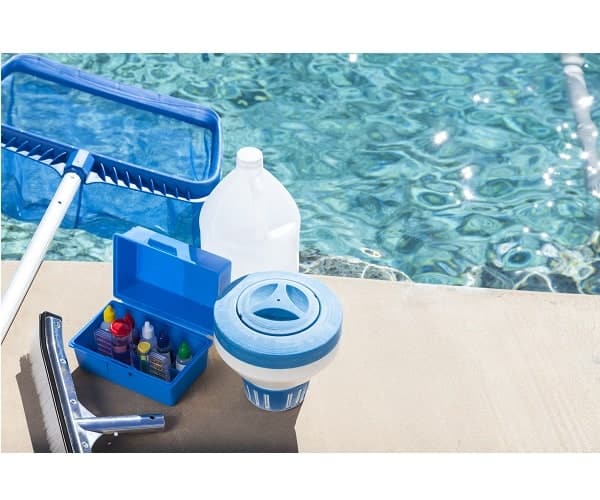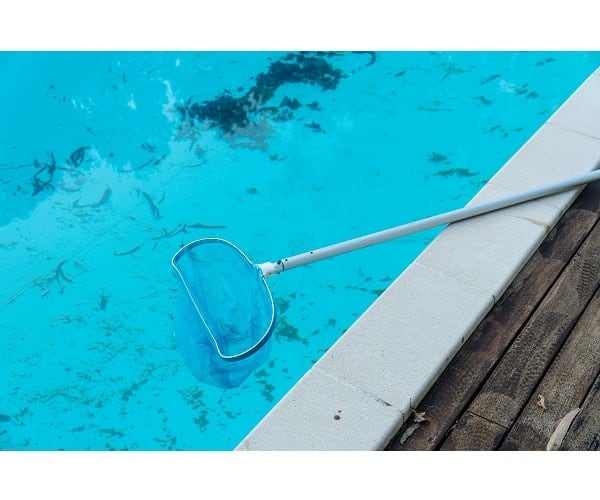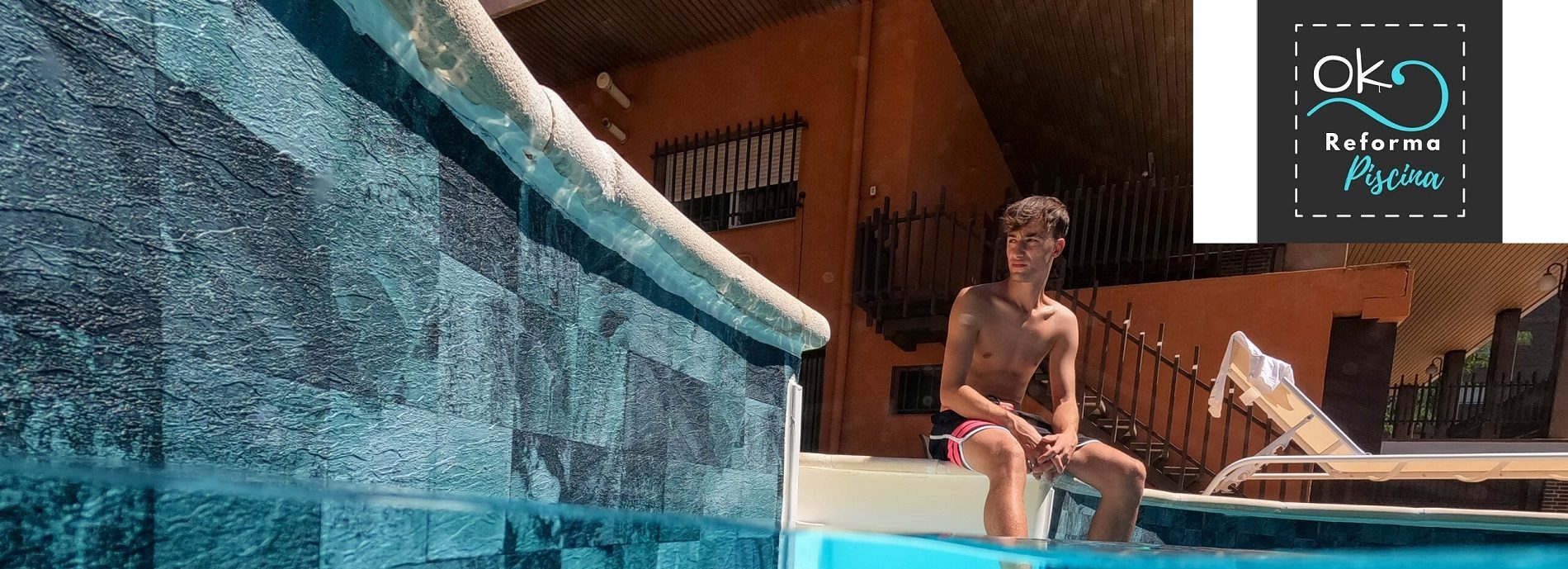
Table of contents of the page
First of all, within Ok Pool Reform and within the section of What is salt chlorination, types of Saline Electrolysis equipment and difference with chlorine treatment We present you an entry about Disadvantages of salt water pools
What is salt chlorination
What is salt chlorination and how does it work?
Salt chlorination is a popular alternative to traditional methods of swimming pool disinfection.
Salt chlorination or salt electrolysis is an advanced sterilization and disinfection system to treat swimming pool water with saline disinfectants. (through the use of chlorine or chlorinated compounds). It works by passing a low voltage current through salt water, which produces
- It works by introducing a small amount of dissolved salt into the pool or hot tub and using a device called a chlorinator to convert the dissolved salt into small amounts of chlorine gas.
- This chlorine gas provides continuous low-level sanitation that helps keep your pool or hot tub clean and bacteria-free.
- The advantage of using salt instead of chlorine tablets is that it does not produce unpleasant odors and is 100% biodegradable and non-toxic.
- Salt-chlorinated pools provide much better water quality than those treated with traditional chlorine products, leaving bathers and spa users feeling soft, clean and fresh after each dip in the pool.
Basic concept of the salt electrolysis process
Generically, Electrolysis is a simple process through which oxygen, hydrogen and all other components present in water are separated. of the pool by applying a direct electric current.
What is a saline pool chlorinator
What is a pool salt chlorinator / salt electrolysis equipment

El salt chlorinator or salt electrolysis for swimming pool It is an electrical equipment that works as an electrical disinfection system for pool water with a salt solution (sodium chloride).
The salt chlorinators are integrated into the filters and they take advantage of salt water to generate chlorine gas through the electrolysis process.
- Going into a little more detail, the salt chlorinator Swimmingpool It consists of a cell and two electrons, one positive and one negative in order to be able to carry out the phases corresponding to electrolysis..
- As we have said above, in the electrolysis process the pool chlorinator separates the multiple elements by applying electric current.
- So basically the concept is that the salt chlorinator will automatically generate natural chlorine, which is extracted from the salt, disinfecting the water and subsequently it will become salt again, so on.
- So, thanks to the salt chlorinator we will bet on alternative disinfection experiences to traditional chlorine.
- And, we will immediately be able to observe the reduction of chemicals in the water and therefore, we will avoid many health problems such as: respiratory disorders, skin diseases...
Summary Disadvantages of saltwater pools
Next, we explain the disadvantages of saltwater pools:

- The first drawback of the saltwater pool is the initial investment (although it is proven that due to all the advantages mentioned above it is returned in the long run).
- Moreover, When investing in a salt chlorinator, it is recommended to integrate a automatic pH regulator, in this way we will avoid having calcareous deposits on the cell electrodes.
- Maintenance and cleaning of electrolytic cells of the saline electrolysis equipment (because they have a tendency to accumulate debris).
- Over time we will have a chlorinator cell wear pool saline.
- We will also notice a very slight increase in electrical consumption.
- And finally, many people do not want this equipment since they believe that the water in the pool will be as salty as the sea, but the level of saltiness is much lower, It is approximately one tenth.
Disinfecting swimming pools with a salt chlorinator without the use of chlorine is a decisive advantage for the health of the skin and respiratory system that increases the beneficial sense of swimming

What are the Disadvantages of saltwater pools?

The initial investment cost of a saltwater pool can be high initially.
However, the initial disadvantages of saltwater pools turn into long-term savings.
The drawback of saltwater pools lies in the economic aspect
Saltwater pools require a greater investment when installing the salt chlorination system.
Saltwater pools may be considered a luxury item by some and many people simply cannot afford them.
However, although the initial expense is higher than a chlorine pool, this outlay is offset by the savings that are achieved later by not having to buy chemical products to maintain the water, since you only have to replace the salt occasionally.
Saltwater pools are becoming more popular, but they have their drawbacks. These are some of the most frustrating aspects of owning a saltwater pool.
Despite the added cost of maintaining a saltwater pool, there are several advantages that make it worth considering. Saltwater pools offer a more natural swimming experience, without the strong chlorine smell and taste often associated with freshwater pools.
Disadvantages of saltwater pools: more expensive to maintain than freshwater pools

Useful guide to know how to clean the pool

Guide to maintaining a pool with water in perfect condition
Saltwater pools are more expensive than traditional freshwater pools, due to the higher cost of maintenance.
- First and foremost, the difference in cost is mainly due to the added expense of purchasing and installing a specialized filtration system capable of converting fresh pool water into salt water.
- Water must be tested periodically and adjusted for salinity levels, which requires additional chemicals and equipment that can increase costs in the long run.
- Additionally, saltwater pools require periodic additions of chlorine or saline solution instead of traditional chlorinating agents, which must be replaced periodically at a higher cost.
- The difference in cost is mainly due to the added expense of purchasing and installing a specialized filtration system capable of converting fresh pool water into salt water.
- Overall, caring for a saltwater pool can be more expensive in the long run than maintaining a traditional freshwater one.
Disadvantages of salt water pools: You have to constantly monitor the level of salt in the water

Although chlorine pools require more regular maintenance than saltwater pools, the latter still require maintenance.
- Ensuring the salt level in the water is a vital task that should not be taken lightly. Too little salt in the water can pose technical and economic problems, while too much salt could have serious consequences for aquatic life.
- To ensure that drinking and irrigation water sources are safe and usable, extensive testing and regular monitoring of salinity levels is necessary.
- Additionally, knowing the salt levels at different points in a river or from one season to another can offer valuable information about possible environmental changes.
- It is imperative that sufficient resources be allocated to the continuous monitoring of all water bodies, to ensure the stability, safety and health of ecosystems for generations to come.
We must also consider that there are many people who do not like swimming in saltwater pools,

Disadvantages of saltwater pools: the water can be aggressive for the skin and eyes
When swimming in a saltwater pool, it is important to take proper precautions to protect your eyes and skin.
- Salt water can cause numerous problems for swimmers, from skin irritations to eye injuries.
- The most common problem caused by swimming in salt water is eye and skin irritation. Salt absorbs moisture from the air, leaving it dry and uncomfortable for bathers. This dryness can cause redness, irritation and itching in the eyes.
- Salt water can also cause stinging of the eyes, as well as increased sensitivity to light.
- It is important to wear eye protection when swimming in a saltwater pool. The glasses must fit well on the face and be made of a non-allergenic material that is resistant to chlorine and salt. Swimmers should also wear a swimming cap to protect hair and ears from dryness caused by salt water.
- When leaving the pool, it is important to rinse your eyes and skin with clean water, as salt water can leave a film of salt. This film can cause further irritation and itching of the eyes and skin. After showering, apply a moisturizing lotion to soothe dry skin.
- The taste of water is also another problem, especially when children swallow water, although the truth is that it is not as salty as sea water, since common salt is used.
Saltwater pools can be pleasant, but it is important to take precautions when swimming in them. Wear eye protection and shower properly afterwards to avoid any eye and skin irritation. With proper care, you can enjoy swimming in a saltwater pool without problems.
Saltwater Pools Can Damage Pool Equipment
Disadvantages of salt water pools: High excess salt can cause corrosive damage to stairs, handrails and other metal elements.
For these reasons, it is necessary to control the salt levels and pH of the water every day and keep the salt chlorination system in perfect working order.
The solution to this problem is to add zinc anodes to the pool and replace the soft stone pavers with pavers that resist the corrosive attack of salt.
- Saltwater pools can be a great way to swim in beautiful, chlorinated water, while avoiding the itchy and dry skin that excess chlorine often causes. However, saltwater pools can have their own problems, as the salt corrodes pool equipment.
- This corrosion can cause serious problems in elements such as the pump, filter and heater, which are crucial for the correct maintenance of the pool.
- If you are thinking of switching to a saltwater pool, invest in a good quality sand filter can help mitigate some of the damage that could occur due to a high concentration of salt.
They are not as effective at heating water as freshwater pools.
Saltwater pools are becoming more popular; However, it has been found that they are not as effective at heating water as freshwater ones.
- This is mainly because salt water is a poor conductor of heat, making it difficult for the heat from the heater to reach the entire body of water.
- Although energy-efficient heaters can be installed to combat this problem, they are quite expensive and impractical.
- Therefore, bathers who wish to enjoy a heated pool can opt for a freshwater model.
Saltwater pools offer a series of advantages that offset
Benefits of saltwater pools
The initial cost of the installation ends up being amortized and makes them a great long-term option
- Saltwater pools are known for their ease of maintenance as they operate with a built-in filtration system. This system helps keep the water clean and clear with minimal effort, which means less time and money spent by the pool owner on cleaning and chemical treatments.
- The salt chlorinators used in this type of pool also require much less. Pool salt is converted to chlorine, eliminating the need to buy and store bottles of chemicals. Additionally, the chlorine generated is much milder than traditional pool chemicals, meaning it causes less skin and eye irritation.
- In addition to reducing costs associated with maintenance and chemical treatments, saltwater pools are also more environmentally friendly than a traditional freshwater pool. The filtration system helps keep the water free of contaminants, chemical treatments, as well as reducing time spent on maintenance.
- Additionally, saltwater pools are much gentler on bathers' skin and eyes than traditional chlorine pools. This is because they do not contain harsh chemicals that can irritate the skin and eyes of bathers.
- Finally, saltwater pools are more environmentally friendly than chlorine pools. This is because they do not release harmful chemicals into the environment, so they are a much better option for people who care about the planet.






